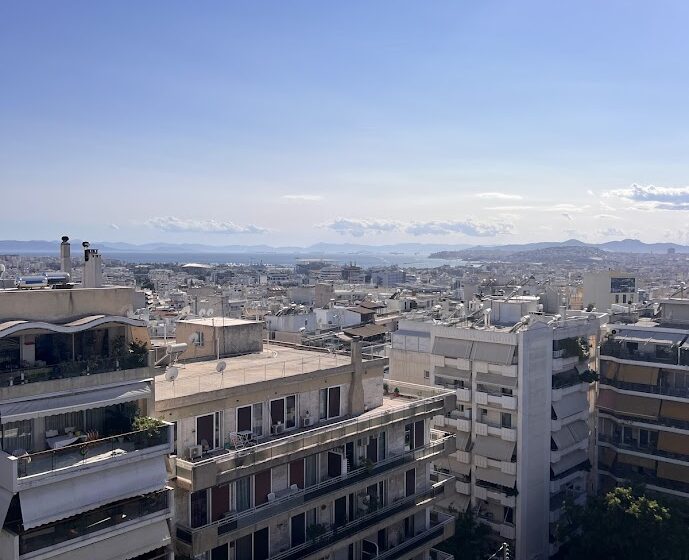Greece extends Airbnb crackdown in 2026: New bans on short-term rental permits hit Thessaloniki, Santorini, Chania, Paros, and Halkidiki amid rising rents and housing shortages. Full details on rules, taxes, and impacts for owners.
Tag: short-term rentals
The Greek government has announced a new regulatory framework introducing additional restrictions on short-term rentals,…
The Greek government has announced a major overhaul of its Golden Visa program, aiming to…
Short-term rentals have become the “heartbeat of small and medium-sized Greece,” according to the Association…
Greece’s short-term rentals are thriving post-summer, with September demand up 4.3% year-on-year, per AirDNA. Occupancy hit 59% as travelers flock to milder islands and Athens, dodging heatwaves and crowds. Prices dipped to €169/night, but RevPAR held at €100 – signaling a year-round tourism shift for the Mediterranean gem.
Greece is tightening rules on short-term rentals, extending the ban on new Airbnbs in central Athens until 2026 while considering similar restrictions in tourist hotspots like Santorini, Thessaloniki, and Chania. From October 1, 2025, stricter safety standards, inspections, and heavy fines will apply to all rental properties.
The Greek government is extending its ban on new Airbnb permits to Thessaloniki, Santorini, Chania, Paros and Halkidiki from October, as soaring short-term rentals drive up housing costs and reduce availability for long-term tenants.
Greece’s tourism season is changing as travelers book either far in advance or at the last minute, shorten stays, and increasingly choose autumn travel. Despite fewer arrivals, tourism revenues are rising due to higher prices and increased U.S. spending.
Santorini and Mykonos, Greece’s iconic island destinations, are seeing a dip in tourist arrivals this season. Santorini reports a 7% drop in ferry bookings and a 19% decline in international flights, driven by early 2025 seismic activity, while Mykonos holds steady with a 2% uptick in June arrivals, buoyed by strong domestic demand. Despite challenges from key markets like the US and Australia, Greek travelers are boosting both islands, though not enough to offset the overall downturn.
Hotels in Mykonos and Santorini are offering deep discounts and showing surprising availability for mid-August, traditionally the peak of Greece’s summer season. Amid rising competition from short-term rentals and increased operating costs, many hotels across popular destinations are turning to last-minute deals to boost occupancy.
Greece has introduced a new business tax targeting legal entities managing multiple Airbnb properties, with…
Property owners with high rental income are forming companies to slash taxes, paying only 22% on net income instead of up to 45%. This strategy, used by over 5,000 new property management companies annually, allows deductions for expenses like cleaning and management fees, especially for short-term rentals.
Discover Greece’s most affordable short-term rental destinations this summer, with Zografou in Attica leading at €67.5 per night and Thessaloniki offering budget-friendly stays at €70.3. Northern cities like Serres, Xanthi, and Komotini provide cost-effective options for travelers seeking value away from tourist hotspots.
This summer, Greece’s iconic islands, including Mykonos and Santorini, are grappling with a surprising decline in short-term rental bookings. Data reveals a 25-30% drop in international arrivals to Santorini, worsened by a recent earthquake, while Mykonos reports falling prices for luxury villas. Other islands like Crete, Rhodes, and Corfu also face a 15-20% dip in demand. Meanwhile, road tourism to Halkidiki is surging, with Central European visitors driving growth. Industry experts cite rising costs as a key factor eroding Greece’s appeal as an affordable destination.
The Independent Authority for Public Revenue (AADE) in Greece has updated guidelines for short-term rentals. Properties leased for 59 days or less annually qualify as short-term. Hosts with two properties on digital platforms are VAT-exempt, but those with three or more must register for VAT. Full details at www.aade.gr/en/short-term-rental.
Europe, the world’s cultural gem, is buckling under a record-breaking tourism surge, with 747 million visitors last year overwhelming its iconic destinations. Greece, hosting nearly four times its population, faces water and housing shortages on islands like Santorini and Mykonos. As locals protest and resources strain, governments scramble with measures like cruise taxes and rental restrictions to balance tourism’s boon with preserving local life.
European investors are flocking to Greece, building luxury vacation homes in prime coastal destinations like Crete, Rhodes, and Lefkada. Dutch, Belgian, and German entrepreneurs are leading the charge, developing upscale villas and apartments to meet growing demand. According to Elxis – At Home in Greece, these projects not only cater to affluent buyers but also boost the Greek economy by creating jobs and stimulating local industries, despite challenges from stricter “Golden Visa” rules and rental regulations.
Greece has risen to 15th place worldwide in tourism, welcoming around 36 million international visitors, a 5% increase from 2023
Skyrocketing rental prices are pushing Greek households to their limits, with the average monthly rent hitting €440 in April, according to ELSTAT. The surge, driven by high demand, limited supply, and a shift to short-term rentals, has made affordability a distant dream for many. The Cyclades lead as the priciest region at €14.2 per square meter, while areas like Kilkis and Vasilika offer some relief with lower rents. As the housing crisis deepens, families across Greece face mounting pressure with no immediate solution in sight.
Greece’s short-term rental sector continues its robust growth in 2025, reaching a significant milestone with…
Greece is set for a vibrant summer, with Airbnb bookings surging 22% for June, July, and August, according to AirDNA. Leading Europe’s travel boom, Greece joins top markets like Poland (+37%) and Norway (+27%), driven by strong demand and rising revenues. With occupancy rates up 18% and average daily rates at €150, the country’s tourism sector is poised for a robust season, fueled by its timeless appeal and resilient travel trends across the continent.
Vouliagmeni remains Athens’ most expensive rental neighborhood at €20.0 per square meter, as Greece grapples with soaring rental prices in 2025. Driven by a short-term rental boom and housing shortages, costs are rising nationwide, with 52% of renters spending over 30% of their income on rent, according to Alpha Bank’s study.
In a major ruling, Greece’s Council of State declared a 2024 tax directive on Airbnb rentals illegal, citing improper publication. The directive, which imposed a business levy on short-term rentals, was challenged by property owners and rental companies. Due to its significance, the case now awaits a final decision from the court’s Plenary Session, potentially reshaping Greece’s short-term rental market.
Greece’s tourism sector is seeing a strong start to 2025 as Orthodox and Catholic Easter coincide. Major cities like Athens and Thessaloniki are welcoming more visitors than ever, while islands like Corfu and Crete experience early-season surges. With record hotel occupancies and high flight demand, Greece’s Easter celebrations are expected to set the stage for a booming summer tourism season.
The Athens Municipality has launched a crackdown on illegal rooftop cafes and restaurants in Plaka, the historic “Neighbourhood of the Gods.” With inspections underway to curb noise pollution and unauthorized businesses, Mayor Haris Doukas announced a Task Force to protect the area’s cultural heritage, starting with enforcing strict regulations in this iconic district.
Greece’s highest administrative court is set to rule on the legality of boutique hotels operating as short-term rentals in Plaka, the historic district beneath the Acropolis. Despite strict zoning laws protecting its residential character, entire buildings have been converted into Airbnb-style accommodations, raising concerns over mass tourism’s impact on the neighborhood. The case, brought by the Hellenic Society for the Environment and Cultural Heritage (ELLET), could set a legal precedent for short-term rentals across Greece, determining whether Plaka remains a living community or becomes a tourist enclave.
A new wave of development is attracting more tourists to Plaka, a district dating back to Neolithic times. Locals are resisting by all means, while a crucial decision by the Council of State regarding Airbnbs in the historic area is pending.
Greece is considering a 100% property tax on non-EU buyers, following Spain’s move to curb speculation. The policy could impact British retirees and international investors, prompting interest in alternative destinations like Cyprus.
Rents in Attica have skyrocketed by up to 100% over the past eight years, pushing both low-income and middle-class households to the brink. Despite government efforts to regulate the market, demand continues to surge while wages fail to keep pace. With a severe housing shortage and thousands of vacant properties remaining off-market, Greece now holds the highest rental difficulty rate in the EU. As living costs soar, the crisis threatens to spiral further, increasing pressure on policymakers to take urgent action.
Greece’s Independent Authority for Public Revenue (AADE) is conducting electronic cross-checks on short-term rental income reported by property owners on platforms like Airbnb. Owners must finalize their 2024 rental declarations by February 28, 2025, or risk hefty fines, including a 100-euro administrative fee for late submissions and penalties for unregistered properties.






























